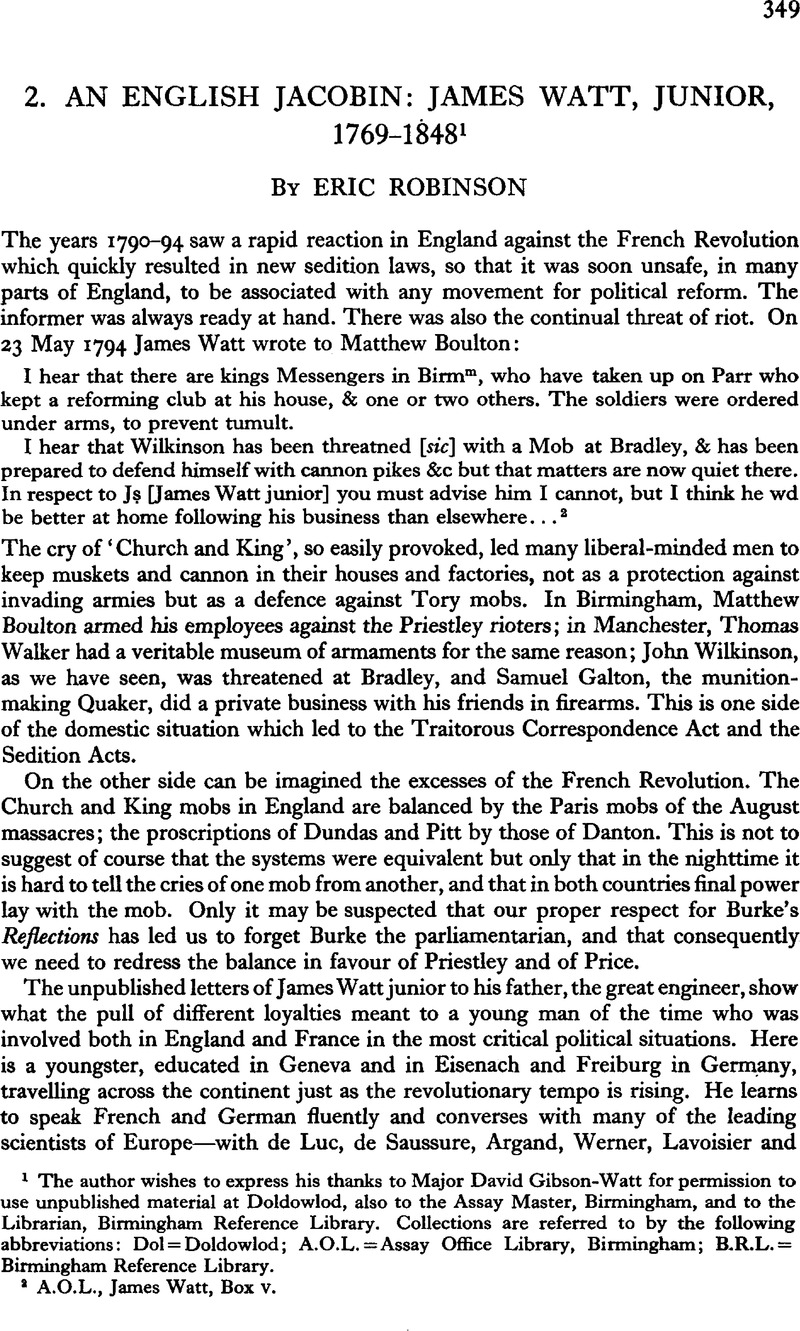Article contents
2. An English Jacobin: James Watt, Junior, 1769–18481
Published online by Cambridge University Press: 20 December 2011
Abstract

- Type
- Notes and Communications
- Information
- Copyright
- Copyright © Cambridge University Press 1955
Footnotes
The author wishes to express his thanks to Major David Gibson-Watt for permission to use unpublished material at Doldowlod, also to the Assay Master, Birmingham, and to the Librarian, Birmingham Reference Library. Collections are referred to by the following abbreviations: Dol = Doldowlod; A.O.L. = Assay Office Library, Birmingham; B.R.L. = Birmingham Reference Library.
References
2 A.O.L., James Watt, Box v.
3 Dol. Packet headed ‘Letters of Jas. Watt Junr. 1784–1787’.
4 Southey, R., Letters from England, ed. Simmons, J. (London, 1951), p. 29Google Scholar.
5 The Derby Mercury for 29 September 1791 has in one column an address of sympathy to Dr Priestley from the Derby Philosophical Society and in the next an address to the People of England from the Dissenting Laymen and Ministers of the West Riding protesting against the Priestley riots.
6 See Robinson, Eric, ‘The Derby Philosophical Society’, Annals of Science (Dec. 1953)Google Scholar.
7 Memoirs of the Manchester Literary and Philosophical Society, 3rd series, ix, p. 173.
8 Fourcroy had raised funds in Paris to compensate the victims of the Priestley riots.
9 J[ames] W[att] jun. (Paris) to J[ames] W[att] (Birmingham), 22 March 1792, Dol. It is interesting to compare with these events in France what had happened in the Lunar Society in Birmingham as reported by James Watt in a letter of 23 November 1791 to Joseph Black (Dol.): ‘The Hellish miscreants who committed so many outrages here, by banishing Dr Priestley, have almost broke up our Lunar Society, at least when we meet we have more politics than Philosophy, so that I have nothing new in the latter line, & the former is not worth troubling you with, any farther than to tell you that this town is divided into 2 parties who hate one another mortaly [sic], that the professed Aristocrates are democrates in practice, that is encouragers of the Mob; and that the democrates, are those who have always contended for a police & good government of the town, therefore are in fact aristocratic at least would have no objections to an aristocracy of which they themselves were members.…’
10 Dol.
11 30 April 1792: Cobbett's Parliamentary History, xxix, pp. 1322–3.
12 Draft of a letter from James Watt to Priestley, 8 July 1791, Dol. Also cf. James Watt to Joseph Black, 17 July 1793 (Dol.): ‘My son James's conduct has given me much uneasiness, though I have nothing to accuse him of except being a violent Jacobin, that is bad enough in my eyes, who abhor democracy, as much as I do Tyranny, being in fact another sort of it.… The Rabble of this country are the mine of Gunpowder that will one day blow it up & violent will be the explosion.…’
13 J.W. jun. (Paris) to J.W. (Birmingham), 19 May 1792, Dol.
14 J.W. jun. (Paris) to J.W. (Birmingham), 15 August 1792, Dol.
15 My italics.
16 J.W. jun. (Paris) to J.W. (Birmingham), 5 September 1792, Dol.
17 J.W. jun. (Paris) to J.W. (Birmingham), 12 September 1792, Dol.
18 J.W. jun. (Nantes) to J.W. (Birmingham) 17 October 1792, Dol.
19 Park, M. C., ‘Joseph Priestley and the Problem of Pantisocracy’, Proceedings of Delaware County Institute of Science (July 1947)Google Scholar.
20 Bage correspondence, B.R.L.
21 Cobbett, op. cit. xxx, p. 552.
22 J.W. jun. (Amsterdam) to J.W. (Birmingham), 3 December 1793, Dol.
23 6 September 1793.
24 My italics.
25 J.W. jun. (Genoa) to J.W. (Birmingham), 6 September 1793, Dol. This is the longest letter in the whole correspondence. There is a great resemblance in the argument with the opinions expressed by James Watt sen. in his letters to Joseph Black cited above.
26 J.W. to Matthew Boulton, 19 May 1794, A.O.L. James Watt, Box v.
27 E. Darwin to James Watt, 19 Jan. 1790, B.R.L.
28 ‘A Day with Wordsworth’, Blackwood's Magazine, Jan. 1927, referred to in Bateson, F. W., Wordsworth; a reinterpretation (1954)Google Scholar. It appears that the younger James Watt knew Wordsworth in Paris: ‘W. was born, he says, in 1770, and he thinks Mr Watt was two or three years his senior, for he went over to Paris at the time of the Revolution in 1792 and 1793, and so was “pretty hot in it”, but he found Mr Watt there before him, and quite as hot in the same cause. They thus began life as ardent (and he adds, thoughtless) radicals, but have both become, in the course of their lives, as all sensible men he thinks have done, good, sober-minded conservatives.…’
- 6
- Cited by




